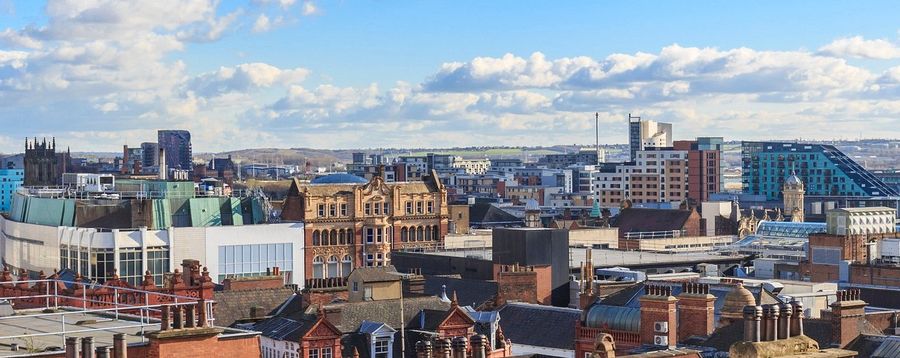
Leeds
Located in West Yorkshire, Leeds is one of the UK’s most dynamic and diverse cities. With a rich industrial past, a thriving arts scene, and a reputation as a shopping and food hub, Leeds offers an enticing blend of history, modernity, and culture. Once at the heart of the British wool trade, Leeds has evolved into a bustling metropolis that remains deeply rooted in its historical significance while embracing its role as a contemporary city of commerce, education, and creativity.
Leeds’ origins date back to the Middle Ages, when it was a small market town. By the 17th century, it had become a center of wool production, contributing significantly to the Industrial Revolution. The city’s growth was driven by its textile industry, and Leeds quickly established itself as one of the leading industrial cities in England, especially in the production and export of wool, linen, and iron.
The Leeds-Liverpool Canal, completed in 1816, further connected the city to the wider world, boosting trade and transportation. By the 19th century, Leeds was a flourishing industrial hub, and its success helped shape the infrastructure of the modern city. Today, many of the city’s historic buildings, such as the Leeds Corn Exchange and Temple Works, are reminders of its prosperous industrial past, while Leeds continues to play a significant role in finance, education, and culture.
Top 5 Unique Characteristics of Leeds
1. Victorian Architecture and the Corn Exchange
Leeds is home to some of the finest examples of Victorian architecture in the UK, and the Leeds Corn Exchange is a prime example. Designed by Cuthbert Brodrick and completed in 1863, the Corn Exchange is an architectural masterpiece with a striking domed roof and intricate stonework. Originally a trading hub for corn merchants, today it is a vibrant shopping center filled with independent boutiques, cafes, and artisan shops. Leeds also boasts other Victorian gems, such as the Leeds Town Hall and the Grand Theatre, offering visitors a chance to experience the grandeur of a bygone era.
2. Roundhay Park
One of the largest city parks in Europe, Roundhay Park covers over 700 acres of lakes, woodlands, and gardens. The park is a favorite among locals and tourists alike, offering a peaceful retreat from the urban bustle. Highlights include the Tropical World indoor rainforest, home to exotic plants, birds, and animals, and the park’s Castle Folly, which provides stunning views of the surrounding landscape. Roundhay Park is also a popular venue for outdoor concerts, sporting events, and festivals throughout the year.
3. Leeds Art Gallery and Henry Moore Institute
Leeds is a city with a rich artistic heritage, and its Leeds Art Gallery is home to an impressive collection of British and international art. The gallery’s collection includes works by renowned artists such as Turner, Constable, and Francis Bacon, making it one of the UK’s leading galleries. Adjacent to the gallery is the Henry Moore Institute, dedicated to sculpture, with exhibitions that showcase the work of Henry Moore, a Leeds-born artist, as well as other prominent sculptors. Together, these institutions highlight Leeds’ contribution to the arts and its role as a cultural center.
4. Leeds Kirkgate Market
One of the largest indoor markets in Europe, Leeds Kirkgate Market has been a central part of the city since 1857. The market is a treasure trove of fresh produce, street food, fashion, and unique finds. It’s also where the world-famous retail chain Marks & Spencer began as a penny bazaar in 1884, and visitors can still shop at an M&S heritage stall within the market. The vibrant atmosphere and eclectic mix of goods make Kirkgate Market a must-visit for those wanting to experience Leeds’ bustling market culture.
5. The University of Leeds and Innovation
Leeds is home to the prestigious University of Leeds, one of the UK’s leading academic institutions. Founded in 1904, the university has a strong reputation for research and innovation, particularly in fields like engineering, medicine, and the arts. The presence of the university has helped to shape Leeds as a city of ideas and creativity, with a thriving student population contributing to its youthful, energetic vibe. The Leeds International Piano Competition, one of the world’s most prestigious music competitions, is also hosted by the university, drawing global talent to the city.
Leeds Today: A Modern, Dynamic City
Today, Leeds is a bustling, modern city known for its finance, tech, and retail sectors. It has become the second-largest financial center in the UK outside of London and is home to a range of innovative companies and start-ups. Leeds Dock has emerged as a hub for creative industries and tech innovation, with the city embracing its role as a leader in digital development.
Leeds is also famous for its shopping, with the Victoria Quarter and Trinity Leeds offering a mix of high-end brands, independent boutiques, and department stores. The city’s food scene is equally diverse, with everything from traditional Yorkshire pubs to Michelin-starred restaurants.
Fun Facts About Leeds
Leeds is home to the first-ever moving picture, created by French inventor Louis Le Prince in 1888.
The Leeds International Film Festival is one of the largest film festivals in the UK.
Marks & Spencer, one of Britain’s most famous retailers, was founded in Leeds Kirkgate Market.
The Hyde Park Picture House in Leeds is one of the oldest cinemas in the world, still in operation since 1914.
Leeds was voted one of the best cities in the UK for quality of life, thanks to its combination of work opportunities, green spaces, and cultural attractions.
With its fascinating history, thriving arts scene, and modern innovation, Leeds is a city that has something for everyone. Whether you’re exploring its Victorian landmarks, enjoying its parks, or delving into its rich culture, Leeds is a destination that will leave you both inspired and delighted.